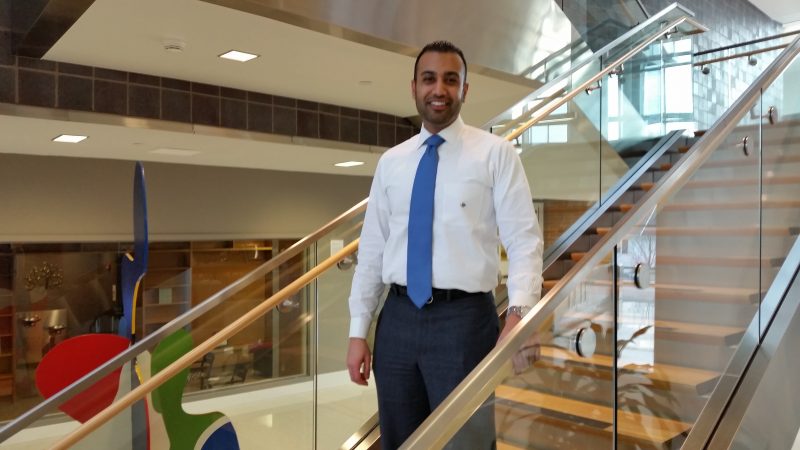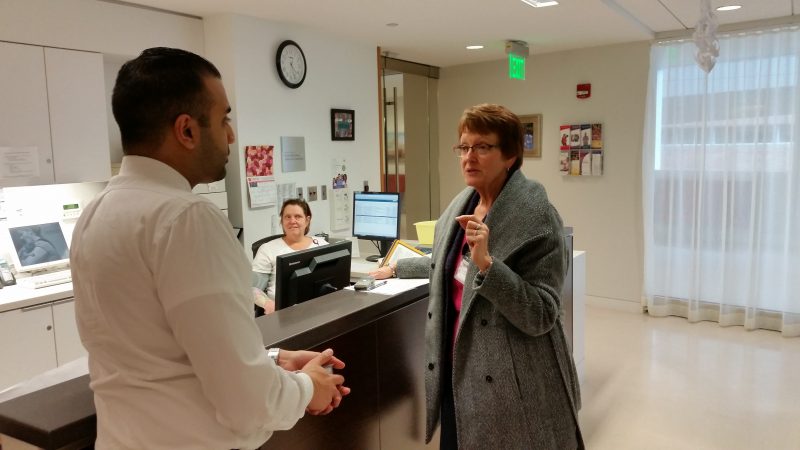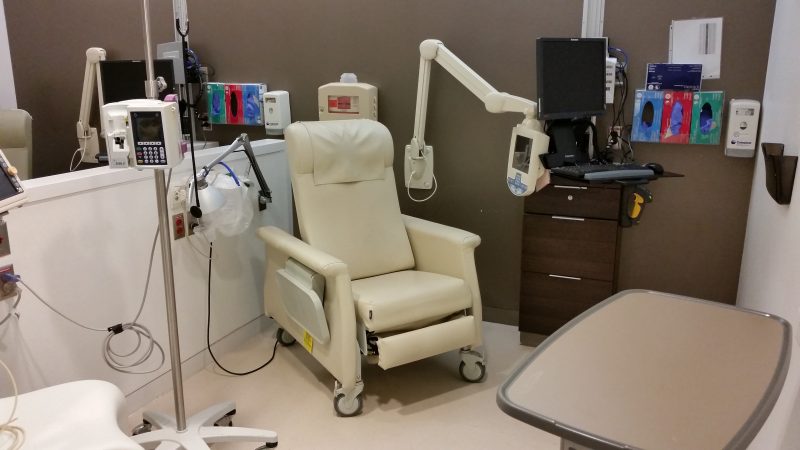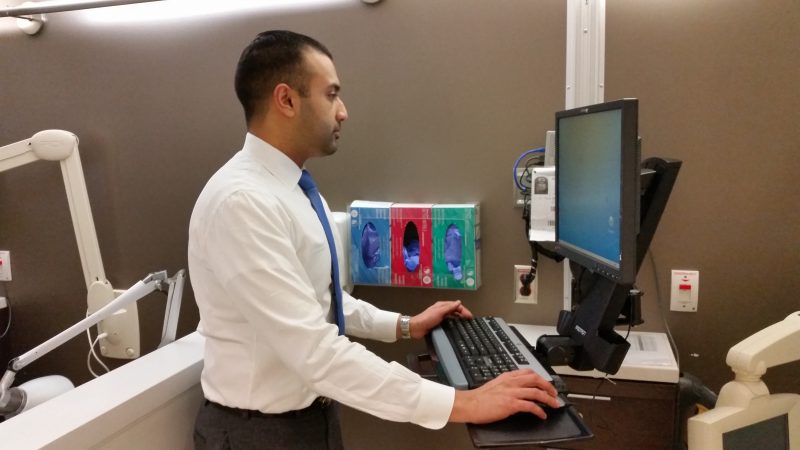Daniel says he has had about a 95 percent success rate
 By Donald Wittkowski
By Donald Wittkowski
“Take two aspirin and call me in the morning” was the advice doctors gave their patients years ago if they had a headache or some other ailment.
Obviously, health care is far more sophisticated these days, but despite all the advances of modern medicine, it has not quite been able to conquer migraine headaches.
“These patients suffer. They can’t go to work. They can’t do things at home, like taking care of the children,” Dr. Joshua Daniel, a neurologist with Shore Physicians Group in Somers Point, explained of debilitating headache pain.
However, Daniel and Shore Medical Center are giving migraine sufferers some dramatic pain relief with a new treatment option called "infusion therapy."
Daniel noted he has had about a 95 percent success rate on the approximately 12 patients he has treated with the therapy since late last year.
“It’s been doing wonders so far,” he said.
Known as the Infusion Center, the therapy area at Shore Medical Center offers a tranquil atmosphere to put patients at ease during their treatments, Daniel said.
“Just walking through it, it’s very nice, very beautiful and very relaxing for the patients,” he said. “They can actually make the room darker. It’s a perfect setting for a migraine. As a neurologist, after seeing all of these patients, you kind of think, ‘Look, the patient needs to be in a nice, comfortable setting, because it’s dark, and they’ll have the best treatment that way.’”

Daniel talks with Anne Marie Taggart, Infusion Center manager at Shore Medical Center.
One of Daniel’s patients, a woman who lives at the Jersey Shore, was tormented by headaches every day of her life for 14 straight years. She was on nearly 10 different medications for her headaches, but nothing took away the pounding pain. However, after undergoing two treatments of infusion therapy in the past two weeks, her headaches have disappeared, Daniel said.
“The first infusion gave her a headache-free day. That was the first headache-free day in her life for 14 years. And with the second infusion, she’s been headache free for five days. She has not had a headache,” Daniel said. “She says she has never felt this good in her life.”
The woman has resumed a normal life with her fiancé, including shopping trips, going to the movies and eating out together for the first time in years. Before, she was on disability and stayed home all of the time, Daniel said.
Daniel urged migraine patients to seek the help of a neurologist for proper diagnosis and treatment options. He believes infusion therapy adds “one more thing to the arsenal to tackle a problem that’s debilitating.”
There are different types of headaches, but infusion therapy is used primarily for people who suffer from severe migraines, or those lasting between 48 and 72 hours. Daniel said quite often the cause is “medication-induced headaches.” It is a vicious cycle in which headache sufferers continue to pop over-the-counter pain relievers to try to help themselves, but only make things worse.
As their headaches persist, they require more and more of the pain relievers to feel better. But what really happens is, they become dependent on the medication and their headaches simply continue, Daniel noted.
“If you’re taking over-the-counter medication about two to three times a week, it’s medication-induced headache. You’re just taking way too much,” he said. “The infusion is great with that, because you need to break the cycle.”
With infusion therapy, patients have fluids and a combination of medications administered through an IV over the course of three to four hours. Afterward, they are put on medications to reduce the frequency and severity of their migraines.

Treatment rooms at the Infusion Center offer comfortable chairs and adjustable lighting to help patients relax.
As the pain diminishes, Daniel tapers off the medications gradually until the headaches are gone. The medications that are used and the length of therapy depend on the patient’s symptoms and headache triggers, Daniel explained.
“I usually tell patients that my goal is to reduce their headache frequency and severity by 50 percent by the end of three months,” he said.
Patients usually need only two infusion treatments over the course of three to six months. Daniel said the most he has given are three treatments.
“It’s not a thing where they need lifelong infusions,” he said. “Infusions just help to take the pain away so the medications they’re on can work really well. You’re kind of breaking the cycle.”
Another advantage of infusion therapy is that it is far less expensive for patients than visiting a hospital emergency room for headache treatment, Daniel said. He pointed out that health insurers routinely cover the cost for therapy.
“To be honest, insurance companies approve this easily,” he said. “It’s because going to the ER, they’re probably going to end up paying at least five or six times more than whatever they pay as an outpatient. I haven’t had one that denied it.”
Patients seeking more information about infusion therapy may call Daniel’s office at (609) 365-6202. Shore Physicians Group is located at 52 E. New York Ave. in Somers Point.

Daniel says he has had about a 95 percent success rate treating patients.
 By Donald Wittkowski
“Take two aspirin and call me in the morning” was the advice doctors gave their patients years ago if they had a headache or some other ailment.
Obviously, health care is far more sophisticated these days, but despite all the advances of modern medicine, it has not quite been able to conquer migraine headaches.
“These patients suffer. They can’t go to work. They can’t do things at home, like taking care of the children,” Dr. Joshua Daniel, a neurologist with Shore Physicians Group in Somers Point, explained of debilitating headache pain.
However, Daniel and Shore Medical Center are giving migraine sufferers some dramatic pain relief with a new treatment option called "infusion therapy."
Daniel noted he has had about a 95 percent success rate on the approximately 12 patients he has treated with the therapy since late last year.
“It’s been doing wonders so far,” he said.
Known as the Infusion Center, the therapy area at Shore Medical Center offers a tranquil atmosphere to put patients at ease during their treatments, Daniel said.
“Just walking through it, it’s very nice, very beautiful and very relaxing for the patients,” he said. “They can actually make the room darker. It’s a perfect setting for a migraine. As a neurologist, after seeing all of these patients, you kind of think, ‘Look, the patient needs to be in a nice, comfortable setting, because it’s dark, and they’ll have the best treatment that way.’”
By Donald Wittkowski
“Take two aspirin and call me in the morning” was the advice doctors gave their patients years ago if they had a headache or some other ailment.
Obviously, health care is far more sophisticated these days, but despite all the advances of modern medicine, it has not quite been able to conquer migraine headaches.
“These patients suffer. They can’t go to work. They can’t do things at home, like taking care of the children,” Dr. Joshua Daniel, a neurologist with Shore Physicians Group in Somers Point, explained of debilitating headache pain.
However, Daniel and Shore Medical Center are giving migraine sufferers some dramatic pain relief with a new treatment option called "infusion therapy."
Daniel noted he has had about a 95 percent success rate on the approximately 12 patients he has treated with the therapy since late last year.
“It’s been doing wonders so far,” he said.
Known as the Infusion Center, the therapy area at Shore Medical Center offers a tranquil atmosphere to put patients at ease during their treatments, Daniel said.
“Just walking through it, it’s very nice, very beautiful and very relaxing for the patients,” he said. “They can actually make the room darker. It’s a perfect setting for a migraine. As a neurologist, after seeing all of these patients, you kind of think, ‘Look, the patient needs to be in a nice, comfortable setting, because it’s dark, and they’ll have the best treatment that way.’”

 Treatment rooms at the Infusion Center offer comfortable chairs and adjustable lighting to help patients relax.
As the pain diminishes, Daniel tapers off the medications gradually until the headaches are gone. The medications that are used and the length of therapy depend on the patient’s symptoms and headache triggers, Daniel explained.
“I usually tell patients that my goal is to reduce their headache frequency and severity by 50 percent by the end of three months,” he said.
Patients usually need only two infusion treatments over the course of three to six months. Daniel said the most he has given are three treatments.
“It’s not a thing where they need lifelong infusions,” he said. “Infusions just help to take the pain away so the medications they’re on can work really well. You’re kind of breaking the cycle.”
Another advantage of infusion therapy is that it is far less expensive for patients than visiting a hospital emergency room for headache treatment, Daniel said. He pointed out that health insurers routinely cover the cost for therapy.
“To be honest, insurance companies approve this easily,” he said. “It’s because going to the ER, they’re probably going to end up paying at least five or six times more than whatever they pay as an outpatient. I haven’t had one that denied it.”
Patients seeking more information about infusion therapy may call Daniel’s office at (609) 365-6202. Shore Physicians Group is located at 52 E. New York Ave. in Somers Point.
Treatment rooms at the Infusion Center offer comfortable chairs and adjustable lighting to help patients relax.
As the pain diminishes, Daniel tapers off the medications gradually until the headaches are gone. The medications that are used and the length of therapy depend on the patient’s symptoms and headache triggers, Daniel explained.
“I usually tell patients that my goal is to reduce their headache frequency and severity by 50 percent by the end of three months,” he said.
Patients usually need only two infusion treatments over the course of three to six months. Daniel said the most he has given are three treatments.
“It’s not a thing where they need lifelong infusions,” he said. “Infusions just help to take the pain away so the medications they’re on can work really well. You’re kind of breaking the cycle.”
Another advantage of infusion therapy is that it is far less expensive for patients than visiting a hospital emergency room for headache treatment, Daniel said. He pointed out that health insurers routinely cover the cost for therapy.
“To be honest, insurance companies approve this easily,” he said. “It’s because going to the ER, they’re probably going to end up paying at least five or six times more than whatever they pay as an outpatient. I haven’t had one that denied it.”
Patients seeking more information about infusion therapy may call Daniel’s office at (609) 365-6202. Shore Physicians Group is located at 52 E. New York Ave. in Somers Point.
 Daniel says he has had about a 95 percent success rate treating patients.
Daniel says he has had about a 95 percent success rate treating patients.